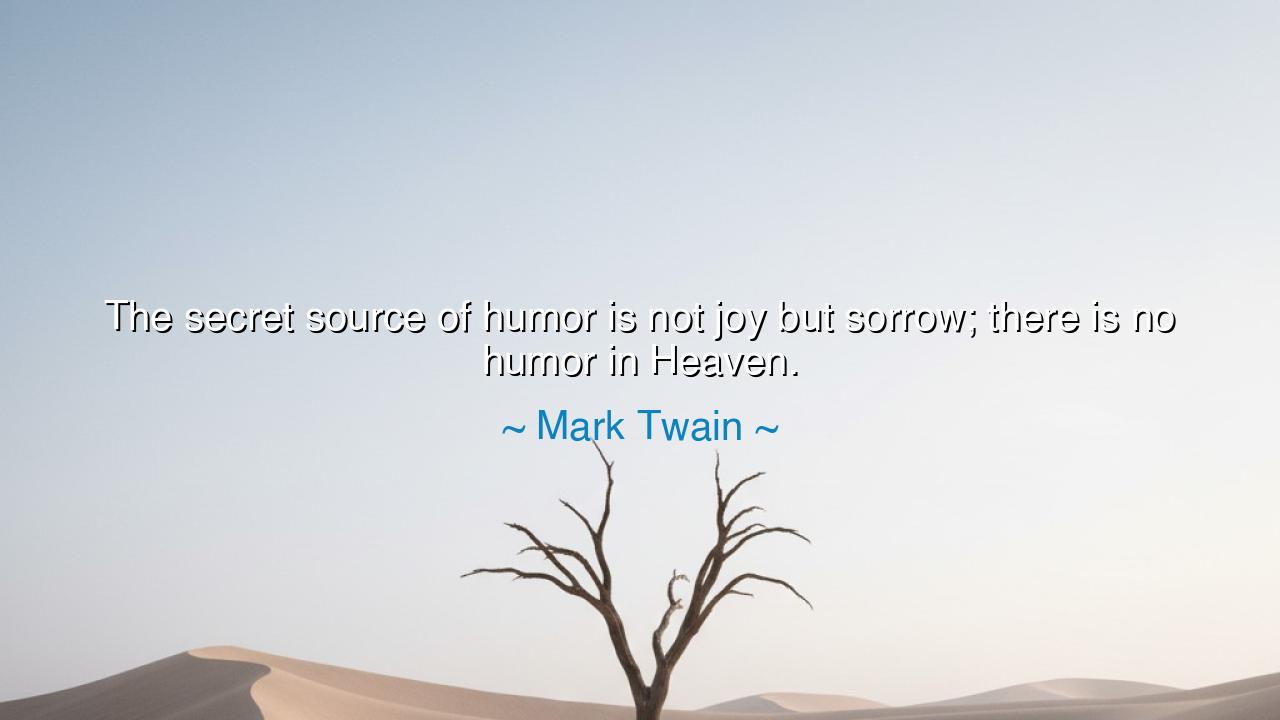
The secret source of humor is not joy but sorrow; there is no






Hearken, children of the ages, and attend the words of Mark Twain, who proclaimed: “The secret source of humor is not joy but sorrow; there is no humor in Heaven.” Understand this: the roots of humor lie not in carefree delight, nor in the serenity of untroubled bliss, but in the shadows of human suffering. It is the heart’s encounter with sorrow, the soul’s confrontation with pain, that births the capacity to see the absurdity, the irony, and the incongruities of existence. Where there is perfect joy, there is no need for reflection, no room for the subtle light of laughter; it is in our trials and misfortunes that humor springs forth.
In the ancient city-states of Greece, the dramatists of old knew this truth well. Aristophanes, whose comedies elicited laughter from audiences, drew his material not from mere merriment, but from the follies, weaknesses, and struggles of men and women. It was the tension between human aspiration and human limitation, the sorrow hidden beneath daily life, that created the fertile ground for wit and laughter. In this way, humor becomes a bridge between suffering and insight, a light cast upon the darker corners of the soul.
Consider the life of Abraham Lincoln, whose path was laden with personal loss, political strife, and the anguish of a nation divided. Those who knew him speak of his quiet, self-deprecating humor, often employed in moments of profound grief. In this sorrow, he discovered a lens through which to see the absurdities of circumstance and the paradoxes of human nature. Twain’s wisdom finds truth here: it is sorrow, not bliss, that nourishes the mind’s capacity for humor, allowing the heart to endure what might otherwise overwhelm it.
Even in the crucible of war, the connection between sorrow and laughter is revealed. Soldiers in the Great War faced death, hunger, and despair daily. Yet, in the trenches, dark jokes and absurd tales sprang forth, lightening the unbearable weight of circumstance. Their humor was born of suffering, a shield for the soul and a testament to the human spirit’s ability to find relief amidst agony. Where joy alone might breed complacency, sorrow inspires reflection, insight, and the playful, piercing observation that is the essence of true humor.
Yet, Twain’s insight carries a subtle admonition: the laughter born of sorrow is not callousness or cruelty. It is a recognition of life’s contradictions, an understanding that in suffering there exists perspective, resilience, and, at times, absurdity. To cultivate humor is to embrace one’s trials with a mind sharp enough to discern the ironic, the paradoxical, and the humanly foolish, without surrendering to bitterness or despair.
History offers another vivid example in the life of Charlie Chaplin, whose films, though hilarious, often drew upon poverty, social injustice, and the trials of the marginalized. In the suffering of his characters—and in his own life—Chaplin discovered the secret wellspring of laughter. It was the sorrow, the human struggle, that allowed audiences to recognize themselves in his humor, finding solace and reflection in the playful expression of pain. Humor, thus, is born in the shadows, illuminating the truths that joy alone cannot reveal.
Children of the ages, the lesson is clear: do not shun the trials and sorrows of life, for they are the fertile soil from which true humor grows. Reflect upon your struggles, perceive the ironies within your difficulties, and allow laughter to rise from understanding rather than mere delight. In this way, sorrow becomes a teacher, and humor its most subtle and profound lesson.
Practical action follows naturally. Observe your life with a keen eye, noting where misfortune and human folly intersect. Share stories that reveal these truths, embrace your own vulnerabilities with gentle wit, and seek the humor that lies hidden in adversity. In doing so, as Twain teaches, you will cultivate a humor born of wisdom and resilience—a light that guides the heart through sorrow, and a shield against the weight of life’s inevitable trials.






AAdministratorAdministrator
Welcome, honored guests. Please leave a comment, we will respond soon